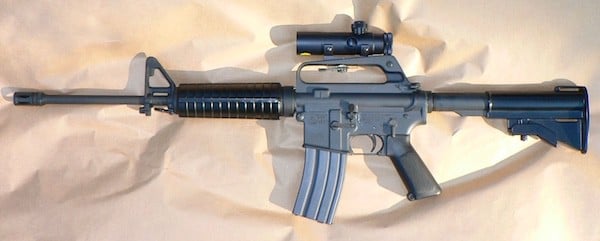
Take a look at the Second Amendment. It provides that “a well regulated Militia, being necessary to the security of a free State, the right of the people to keep and bear Arms, shall not be infringed.”
Native English speakers might have trouble parsing that language, but for more than 200 years, federal judges understood it quite well. In a series of cases, the federal courts recognized that the right embedded in the Second Amendment was limited in two important ways.
First, the provision applied to having arms for military purposes. We may recall from our history classes that the early military in the colonies and in the young Republic was constituted mainly from regular citizens who took up arms to kick the British or defend themselves against rebellion.
Second, the provision applied to the federal government. For many years, all of the parts of the Bill of Rights — the first 10 amendments to the Constitution — only applied to the federal government. That meant, for example, that where the First Amendment said “Congress shall make no law …” abridging freedom of speech, religion, and the press, it meant only that the federal Congress “shall make no law.” State legislatures and local governments were free to pass laws that might have run afoul of the provision.
These two limitations are part of the Supreme Court's 1939 decision in United States v. Miller. That case addressed a federal law banning the possession of, among other things, a sawed-off shotgun. Because, at the time, such a weapon was never going to be used by a “well regulated militia” or have any connection to warfare and national defense, Congress was within its power to restrict its use, possession, and sale.
Miller is still good law, but a decades-long effort by the National Rifle Association, the Heritage Foundation, and other right-wing advocacy organizations has both chipped away at Miller and created a generation of lawyers and jurists that don't believe in it anyway.
In 2008, the Supreme Court decided that the Second Amendment protected an individual's right to keep a handgun in his house for self-defense. That case, United States v. Heller, was about a law in the District of Columbia. Two years later, in McDonald v. Chicago, the Court held that Chicago could not outlaw the possession of handguns by private citizens. Both cases were decided 5-4.
I believe that Heller and McDonald were both wrongly decided. They fly in the face of Miller and McDonald, in particular, denies the reality that different states and localities have different kinds of gun problems. They should be allowed to approach it differently, both as a way to protect gun owners in Wyoming and gun shot victims in Los Angeles.
But despite the conservative onslaught radicalizing modern interpretations of the Second Amendment, there is nothing in either Heller or McDonald that would prevent a state or Congress from stepping in and outlawing the kind of weapons tragically used in Sandy Hook a few years ago and in Las Vegas just yesterday (and in Virginia, Colorado, and so many other places I can't even remember!). I would go even further: The only reason Heller got a 5 person majority was because it was written so narrowly as to permit such restrictions.
First, Heller did not overrule Miller. Specifically, the Court “read Miller to say only that the Second Amendment does not protect those weapons not typically possessed by law-abiding citizens for lawful purposes, such as short-barreled shotguns.” At the time, sawed-off shotguns met that test. Today, machine guns are not typically possessed by law-abiding citizens for lawful purposes. Hunters do not need machine guns. Those in need of self defense do not need machine guns. Machine guns can be banned.
Second, in writing Heller, the late-Justice Antonin Scalia specifically limited the decision not only to weapons used in self defense, but to weapons used in self defense in the home. It does not cover concealed weapons, firearms in the hands of felons or the mentally ill, or guns near schools or churches or hospitals. Nor does Heller say anything about selling guns or the ability of Congress to pass laws banning any of those things. You can be sure that many of the conservatives on the Court, including the new Justice Neil Gorsuch, seated on the Court in what can only be described as a coup, is going to try to use Heller to cover these situations. When they do, they will be lying. In spite of all of their efforts over the last few decades, the NRA and conservative jurists have failed to create an individual right to own and carry guns.
Congress's inaction on gun safety has nothing to do with the law on the books. It has everything to do with politics. Elections matter. If you want reasonable gun safety legislation, we need more Democrats, in state houses, in governorships, in Congress, and in the White House.



